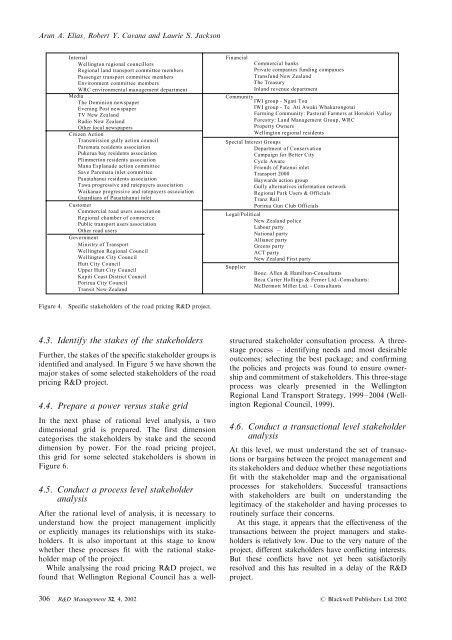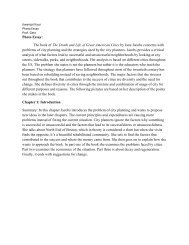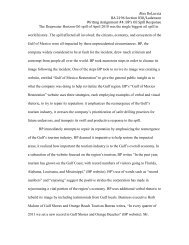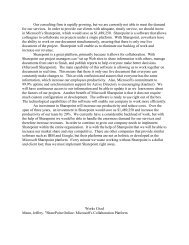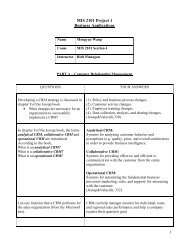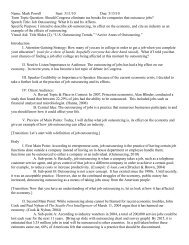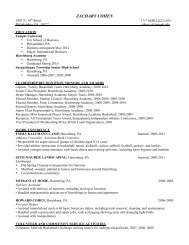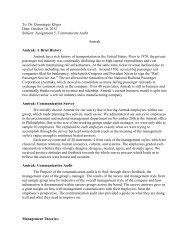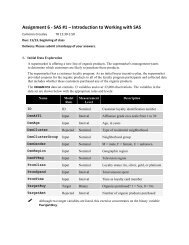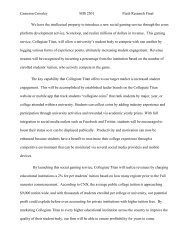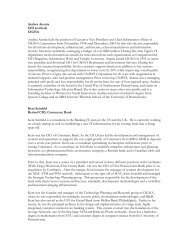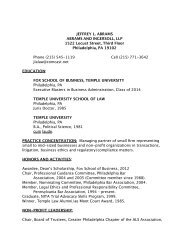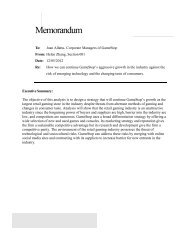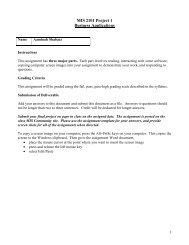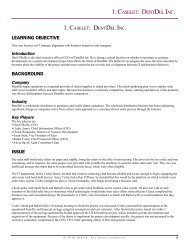Stakeholder analysis for R&D project management - Temple Fox MIS
Stakeholder analysis for R&D project management - Temple Fox MIS
Stakeholder analysis for R&D project management - Temple Fox MIS
Create successful ePaper yourself
Turn your PDF publications into a flip-book with our unique Google optimized e-Paper software.
Arun A. Elias, Robert Y. Cavana and Laurie S. Jackson<br />
Internal<br />
Financial<br />
Wellington regional councillors<br />
Commercial banks<br />
Regional land transport committee members<br />
Private companies funding companies<br />
Passenger transport committee members<br />
Transfund New Zealand<br />
Environment committee members<br />
The Treasury<br />
WRC environmental <strong>management</strong> department<br />
Inland revenue department<br />
Media<br />
Community<br />
The Dominion newspaper<br />
IWI group - Ngati Toa<br />
Evening Post newspaper<br />
IWI group - Te Ati Awaki Whakarongotai<br />
TV New Zealand<br />
Farming Community: Pastoral Farmers at Horokiri Valley<br />
Radio New Zealand<br />
Forestry: Land Management Group, WRC<br />
Other local newspapers<br />
Property Owners<br />
Citizen Action<br />
Wellington regional residents<br />
Transmission gully action council<br />
Special Interest Groups<br />
Paremata residents association<br />
Department of Conservation<br />
Pukerua bay residents association<br />
Campaign <strong>for</strong> Better City<br />
Plimmerton residents association<br />
Cycle Aware<br />
Mana Esplanade action committee<br />
Friends of Patenui inlet<br />
Save Paremata inlet committee Transport 2000<br />
Pauatahanui residents association<br />
Haywards action group<br />
Tawa progressive and ratepayers association<br />
Gully alternatives in<strong>for</strong>mation network<br />
Waikanae progressive and ratepayers association<br />
Regional Park Users & Officials<br />
Guardians of Pauatahanui inlet<br />
Tranz Rail<br />
Customer<br />
Porirua Gun Club Officials<br />
Commercial road users association<br />
Legal/Political<br />
Regional chamber of commerce<br />
New Zealand police<br />
Public transport users association<br />
Labour party<br />
Other road users<br />
National party<br />
Government<br />
Alliance party<br />
Ministry of Transport<br />
Greens party<br />
Wellington Regional Council<br />
ACT party<br />
Wellington City Council<br />
New Zealand First party<br />
Hutt City Council<br />
Supplier<br />
Upper Hutt City Council<br />
Booz. Allen & Hamilton-Consultants<br />
Kapiti Coast District Council<br />
Beca Carter Hollings & Ferner Ltd.-Consultants:<br />
Porirua City Council<br />
McDermott Miller Ltd. - Consultants<br />
Transit New Zealand<br />
Figure 4.Specific stakeholders of the road pricing R&D <strong>project</strong>.<br />
4.3. Identify the stakes of the stakeholders<br />
Further, the stakes of the specific stakeholder groups is<br />
identified and analysed.In Figure 5 we have shown the<br />
major stakes of some selected stakeholders of the road<br />
pricing R&D <strong>project</strong>.<br />
4.4. Prepare a power versus stake grid<br />
In the next phase of rational level <strong>analysis</strong>, a two<br />
dimensional grid is prepared.The first dimension<br />
categorises the stakeholders by stake and the second<br />
dimension by power.For the road pricing <strong>project</strong>,<br />
this grid <strong>for</strong> some selected stakeholders is shown in<br />
Figure 6.<br />
4.5. Conduct a process level stakeholder<br />
<strong>analysis</strong><br />
After the rational level of <strong>analysis</strong>, it is necessary to<br />
understand how the <strong>project</strong> <strong>management</strong> implicitly<br />
or explicitly manages its relationships with its stakeholders.It<br />
is also important at this stage to know<br />
whether these processes fit with the rational stakeholder<br />
map of the <strong>project</strong>.<br />
While analysing the road pricing R&D <strong>project</strong>, we<br />
found that Wellington Regional Council has a wellstructured<br />
stakeholder consultation process.A threestage<br />
process – identifying needs and most desirable<br />
outcomes; selecting the best package; and confirming<br />
the policies and <strong>project</strong>s was found to ensure ownership<br />
and commitment of stakeholders.This three-stage<br />
process was clearly presented in the Wellington<br />
Regional Land Transport Strategy, 1999–2004 (Wellington<br />
Regional Council, 1999).<br />
4.6. Conduct a transactional level stakeholder<br />
<strong>analysis</strong><br />
At this level, we must understand the set of transactions<br />
or bargains between the <strong>project</strong> <strong>management</strong> and<br />
its stakeholders and deduce whether these negotiations<br />
fit with the stakeholder map and the organisational<br />
processes <strong>for</strong> stakeholders.Successful transactions<br />
with stakeholders are built on understanding the<br />
legitimacy of the stakeholder and having processes to<br />
routinely surface their concerns.<br />
At this stage, it appears that the effectiveness of the<br />
transactions between the <strong>project</strong> managers and stakeholders<br />
is relatively low.Due to the very nature of the<br />
<strong>project</strong>, different stakeholders have conflicting interests.<br />
But these conflicts have not yet been satisfactorily<br />
resolved and this has resulted in a delay of the R&D<br />
<strong>project</strong>.<br />
306 R&D Management 32, 4, 2002 # Blackwell Publishers Ltd 2002


